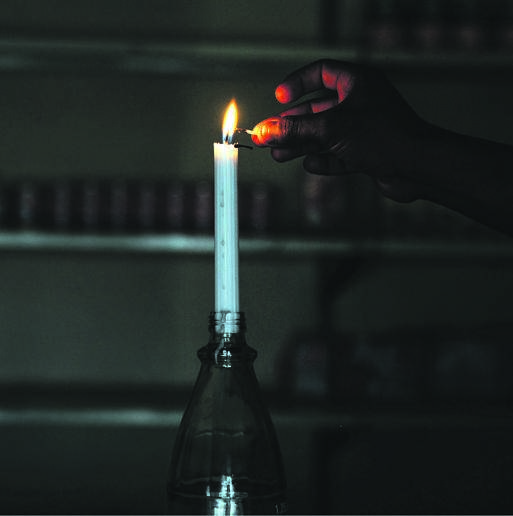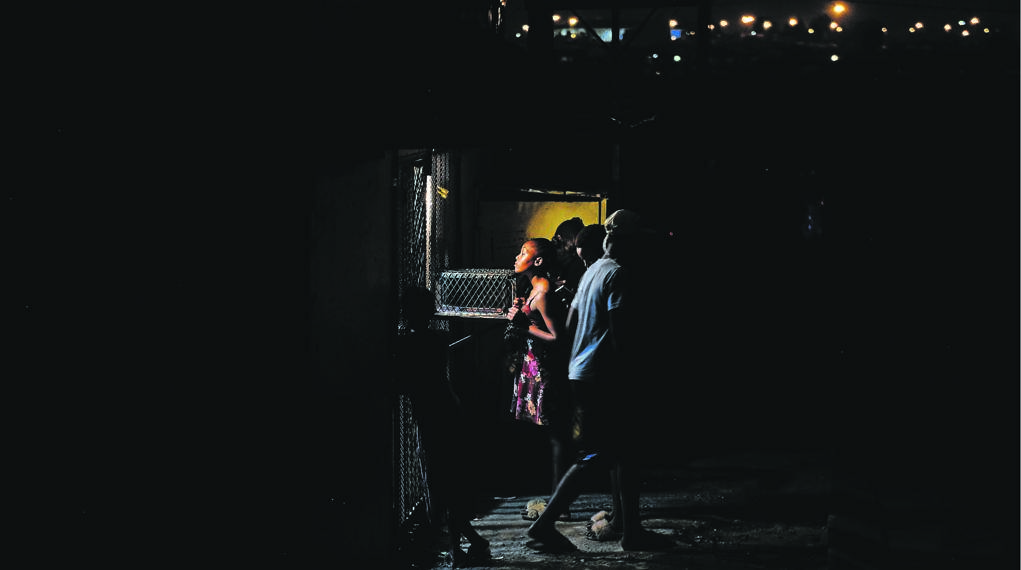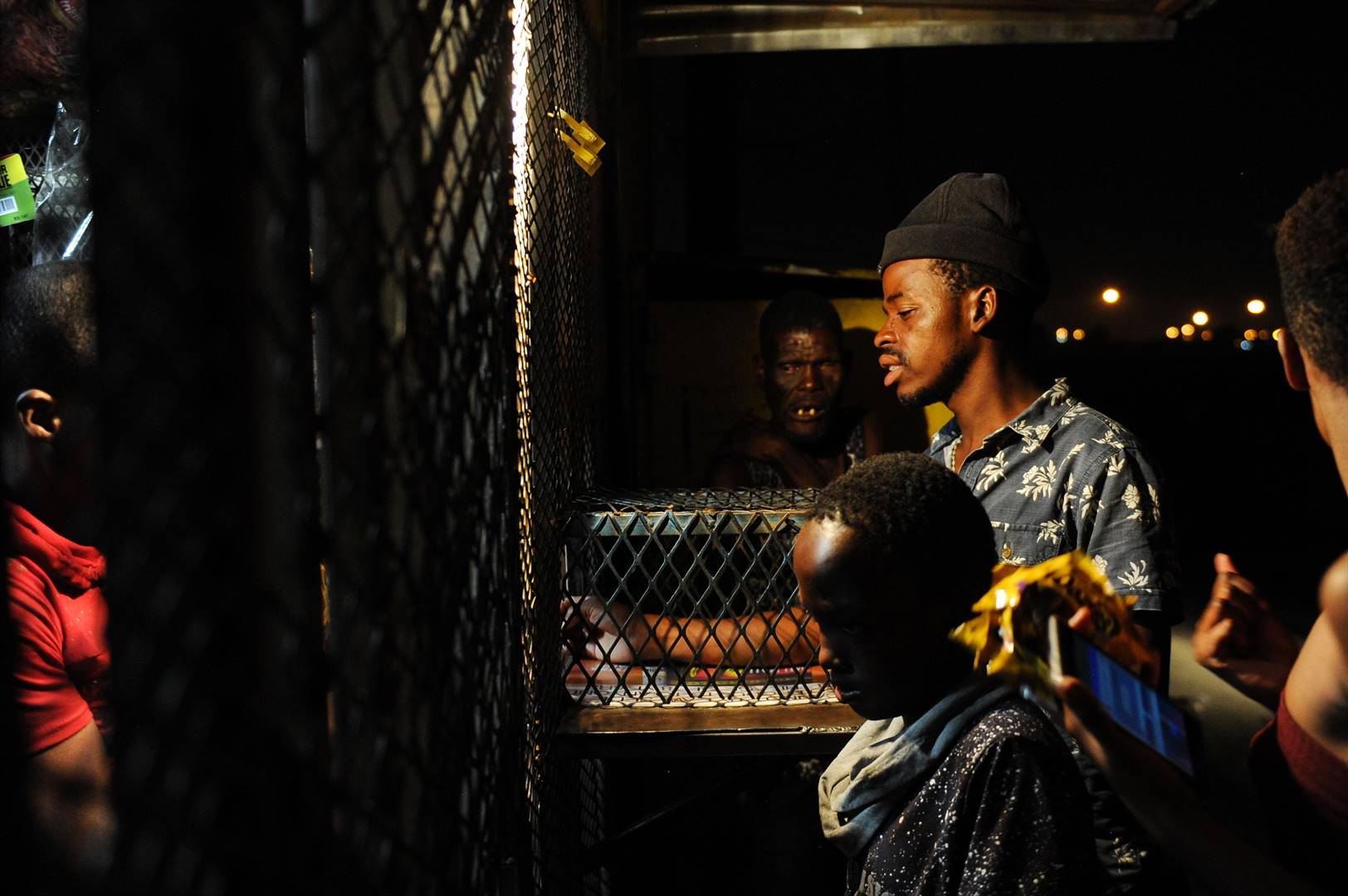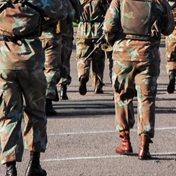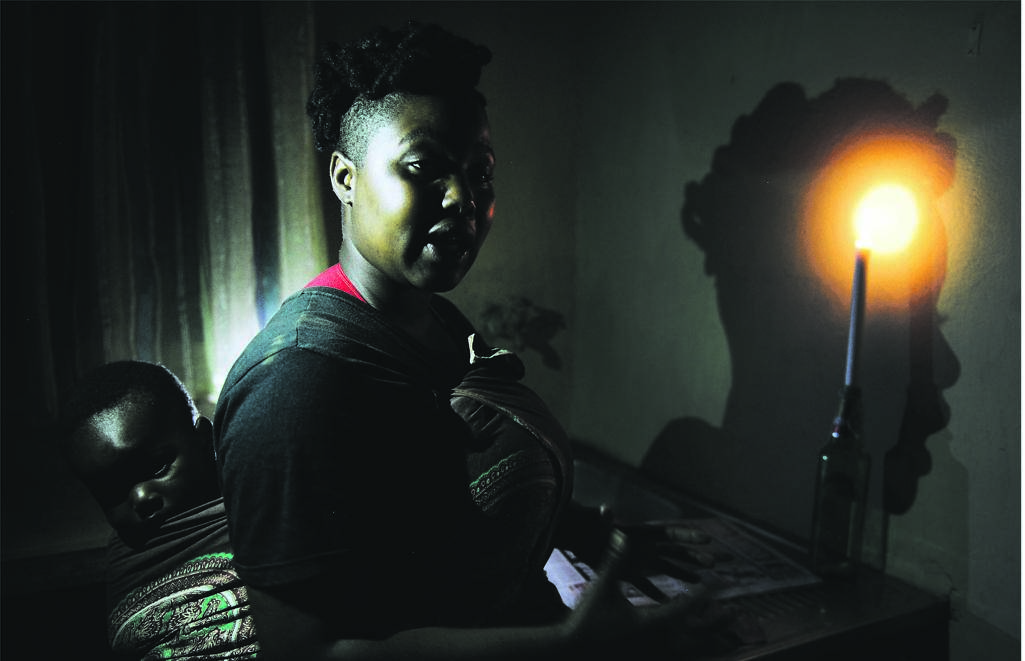
It is 7pm. The streets of Nomzamo in Orlando, Soweto, are dark.
In the yard of a white-painted house, on what residents of the area call 4-ways Street, 18-year-old Grade 11 pupil Nwabisa Madliwa sits outside on a camping chair in an attempt to do her homework.
Her siblings try to assist her by shining a torch on her work.
They hope that their sister will make a success of her schooling career, even though the community has had no electricity since July last year.
Nwabisa writes eagerly as she squints her eyes, trying to read what is written on the pages of her school book.
Inside the family home – a four-roomed house – Nwabisa’s sister, 27-year-old Siyamthanda Mkhontwana, is preparing supper for her family of eight, who live with her.
While she carries her one-year-old child on her back, Siyamthanda puts wood and newspaper into the makeshift metal charcoal stove with two plates.
The family had to buy it for R650 following the disconnection of electricity last year.
“It normally takes me longer to cook because I am usually alone, but today my cousin is helping me,” she says as she wipes the sweat from her face.
“When I am alone, I have to make sure that the fire is constantly burning by putting wood and paper in. I also have to make sure that the food does not burn and stir it constantly.”
Siyamthanda shares the house with her mother, Thobeka Mkhontwana (51), her three children and her three siblings.
A candle near the sink and the fire from the makeshift stove provide light.
However, Siyamthanda’s two biggest worries are her sister Nwabisa’s education and her son, who “inhales the smoke from the fire I use to cook”.
“He is 12 months old and he can walk, so when I cook or boil water, I have to carry him on my back because I am scared I may turn my back for a minute and he will touch the hot stove,” she says.
“My little sister is in Grade 11 and we want to see her do well. But without electricity how will that happen? Children come back from school tired, but they cannot even take a 15-minute break because then they have to do homework in the dark, like my sister is doing right now.”
Siyamthanda says she does not understand how her family’s electricity was disconnected when “we used a prepaid meter”.
Power utility Eskom has been under fire since starting with what it calls load shedding a few years ago.
Last year, President Cyril Ramaphosa called out municipalities and large settlements, including Soweto, for not paying their electricity bills.
He said South Africans needed to change their attitudes and get rid of the culture of not paying for services.
In the face of debt amounting to R4 billion, Eskom took to disconnecting electricity in the different areas, and announced that Soweto had an outstanding bill of R18 billion.
Nomzamo residents in Soweto, who had their power disconnected eight months ago, took to the streets in protest this week.
READ: Soweto councillor calls on residents to join Eskom march
“We have a prepaid meter. We have rooms that we rent out, but since our electricity has been disconnected, we have lost tenants because they said they were moving to areas with electricity. We have lost our source of income,” says Siyamthanda.
As an unemployed mother and the eldest of her siblings, Siyamthanda says “even the process of finding employment has become difficult”.
“We cannot charge our phones. So, that means even if I have applied somewhere and the company tries to call me, it probably will not be able to get hold of me because I have to take my phone to another area to charge it,” she says.
She opens the fridge in the kitchen. Her family now uses it “as a wardrobe, because it has become useless as a fridge”.
As she takes a moment to catch her breath, Siyamthanda stands at the end of her street and points to the next neighbourhood.
“Look at how bright the lights are over there, but for us, the past eight months have been a struggle.”
THE NEIGHBOUR
Thembela Qgwetha (62) lives down the street with his three sons. The youngest, he says, is three years old.
“Our government has failed us,” he says.
“When they want us to vote for them, we see them all over the area. But they should not come here until there is electricity. They should go to the places where they are able to provide electricity.”
Qgwetha uses a gas stove, which costs him R500 a month.
“This is the life we have been subjected to,” he says, as he steps into the next room.
He walks back, holding a candle in a bottle. It is his only source of light.
“I do not know how many candles this bottle has held,” he says, pointing out the dried wax drops down the side.
“Our politicians are not on our side. Our area is suffering and the level of crime in the area has increased because of the dark streets. Our children and women have been victims and cannot even walk freely in their own neighbourhood,” he says as he cups his head in his hands.
“A candle costs me R3.50, and when my gas runs out I must buy paraffin, which costs R13 a litre. That may not seem like a lot of money to some people, but it is to me.”
THE SHOP OWNER
A group of five young men sit outside a tuckshop, which, unlike most houses on the street, has power.
Residents crowd around the Zindala Tuckshop, trying to purchase necessities before owner Aster – “just call me Aster; everyone does” – closes for the night.
“I will help you now,” he shouts.
Aster, a Tanzanian, says he realised that he had to get a generator to sustain himself and the community
“They cut off electricity last year,” he says as he serves a customer.
“I could not just sit and let that cost me my business.”
Aster admits that he has, in a sense, benefited from the situation.
“People buy a lot of candles. I think it has been one of the most purchased products at my shop in the past couple of months.”
On Tuesday, Nomzamo residents took to the streets to challenge the R18 billion amount that Eskom says the residents owe for electricity.
Among other things, residents are demanding: restoration of power to all affected areas, an increase in the amount of free basic electricity, a R150 flat rate per household and the clearing of all existing debts.
WHAT ESKOM SAYS
The power utility released this press statement in response to this week’s –public protests: “All Eskom tariffs are regulated by the National Energy Regulator of SA, and Eskom abides by those tariffs for each category of customers. Soweto customers therefore pay tariffs applicable to their category, as with all customers supplied by Eskom throughout the country.
“Eskom cannot negotiate separate tariffs outside of what is regulated. A fixed charge will result in customers paying a fixed amount, irrespective of their consumption. This leads to the wasteful usage of electricity.
“Eskom is ready to restore supply in areas where communities are cooperating to adequately deal with this matter, by allowing us access to the area so we can conduct audits, remove illegal connections, disconnect bypassed meters and issue fines for the contraventions. When this process is complete and fines are paid, Eskom will restore supply.
“Eskom is not in a position to continuously replace failed mini substations and pole-mounted transformers in areas where the residents are not paying for their electricity.
“Nonpayment of electricity does not only affect the security of supply for paying customers, it also contributes to increased energy and revenue losses, coupled with increased operational costs. This is not sustainable and is not in line with Eskom’s revenue management practices. The nonpayment further frustrates efforts to improve on Eskom’s financial and operational objectives.”
 |
| ||||||||||||
| |||||||||||||




 Publications
Publications
 Partners
Partners




